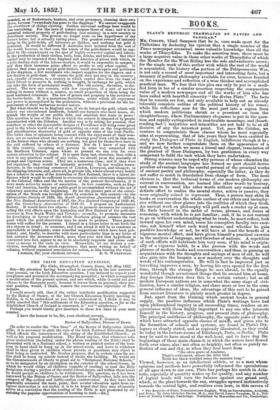THE IRISH EDUCATION QUESTION.
The Glebe, Stranyford, County Down, 5th May 1852. Sni--My attention having been called to an article in the last number of your journal, on the Irish Education question, I am induced to request your acceptance and perusal of the accompanying pamphlet ; in which is suggested a modification of the present system, and one which, while it could not give offence to the Romanist party, because it leaves them in precisely their pre- sent position, would, I think, remove the conscientious objections of Pro- testants.
I would merely add, that if the rather indefinite modification suggested by the Bishop of Ostrom at the late Church Education Society meeting in Dublin, is to be understood as you have understood it, I think it may be safely asserted that "this settlement of the Education question, so far as the Established Church of Ireland is concerned, is" not "satisfactory."
Perhaps you would kindly give insertion to these few lines in your next number.
I have the honour to be, Sir, your obedient servant, Semi F. GORDON, Rector of Ballyculter, Diocese of Down.
[In order to render the "few lines" of the Rector of Ballyculter intelli- gible, it is necessary to state the rule of the Irish National Education Board which offends the consciences of the clergy of the Established Church ; as well as his proposed modification. The Board enjoins, that whenever reli- gious instruction (including under the phrase reading of the Bible) shall be proceeded with in a National school, a written or printed notice of the busi- ness in hand shall be hung up in the school-room, and leave to withdraw shall be then given to children whose parents or guardians may object to their being so instructed. Mr. Gordon proposes, that in certain cases the no- tice shall be hung up outside instead of inside the building. He would set the Commissioners at liberty to grant aid to "Scriptural National Schools," BO to be designated by an inscription on the exterior of the school-house, in which he would oblige all children (capable of reading) to read the Holy Scriptures during a portion of the stated school-hours, and within those hours he would permit no children to be withdrawn. The question, as it has been narrowed by the Bishop of Ossory and the Rector of Ballyculter, falls into the category of Big-enclian and Little-endian controversies. As they have both practically conceded the main point, that secular education apart from re- ligious instruction is not sinful, it is to be hoped that they may ultimately arrive at a conviction that the reading of the Bible is not promoted by re- stricting the popular opportunities of learning to read.—En.]


























 Previous page
Previous page